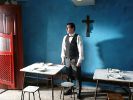Eye For Film >> Movies >> Historic Centre (2012) Film Review
Situated in northern Portugal, Guimarães was first conquered in the 9th century by the Galician duke Vimara Peres, who named the city Vimaranes and chose it to host the main government seat for what was then the County of Portugal. Commissioned as part of the city’s run as European Capital of Culture in 2012, Historic Centre (Centro Histórico) brings together four of the continent’s most revered directorial talents: Finnish auteur Aki Kaurismäki, Spaniard Victor Erice, Lisboan Pedro Costa and Porto-born Manoel de Oliveira, whose undimmed work rate at 104 years old never ceases to stagger.
Though each filmmaker provides typical servings of his own respective style in responding to the brief at hand, this portmanteau piece is predictably uneven, not least in its temporal distribution (Kaurismäki and de Oliveira bookend the work with contributions that clock in at around 13 minutes each, while the other two outstay their welcome). Differing styles and perspectives are the name of the game, of course, but it can be quite a challenge to readjust whenever the change in pace and personnel occurs. It doesn’t help that at least two of the contributors here seem to be trying too hard.

Kaurismäki – who in national terms at least is the most obvious tourist on board – kicks off proceedings with The Tavern Man. His wordless protagonist (Ilkka Koivula) runs a side-street café whose blackboard menu boasts soup for €1.80 and nothing else; watching a rival restaurant fill with customers, he realises seafood is the way forward, and so introduces sardines in olive oil and fisherman’s soup. Deadpan to the end, Kaurismäki’s everyman eats elsewhere, remembers or imagines better days, and visits the barber to get his hair cut to the sound of a live guitar.
Costa’s entry, Sweet Exorcism, is more than double the length of its predecessor and says a great deal less. A group of people – urban dwellers by look but apparently relocated to a forest – cry out for Ventura (Costa’s regular performer Ventura), who appears shortly after in some kind of purgatorial elevator alongside a somnambulant soldier. An oblique riff on Portugal’s military coup in 1974, this contribution doesn’t appear to fulfil the brief, never mind engage the audience. Allegory is presumably the intention, but irritation takes over early and reigns like an unwelcome dictatorship.
At least Erice – whose infrequent output has no doubt contributed to his own reputation among critics – anchors his effort with historical specificity. Titled Broken Windows, it focuses on the now-abandoned Vizela River Spinning and Textiles Factory, and is dedicated to everyone who worked there between 1845 and 2002. More specifically, Erice’s interest is in the memories that might haunt this ghost space, and he sets up a succession of screen tests in which a cast of performers recite and/or act out the testimonies of those who actually worked there.
All good and well, of course, but memory in and of itself is as dull a theme as any, and the combination of an unhurried pace, performative style and unflinching rhythm gradually becomes enervating. It should be no secret by now that capital is constantly relocated in pursuit of a less politically organised workforce (hence the factory’s closure and its owners’ move to Asia), and so while Broken Windows is legitimately mournful, it is visually cold, structurally stiff and tonally stale, lacking the spontaneity and insight required of a genuinely dynamic historical viewpoint.
At 35 minutes, Erice’s contribution is the film’s longest. All the more relieving, then, that de Oliveira’s conclusion, The Conquered Conqueror, is half the length, returning to a more healthily comical vibe, as a group of tourists (two female blondes the most prominent among them, if that’s intended as a shorthand for anything) are ushered around the UNESCO World Heritage Site of Guimarães’ historic centre. Two statues are of momentary interest to this bunch of snap-happy bus-hoppers: that of Vimara Peres, its Galician founder, and that of Portugal’s first king, Afonso I, who was reportedly born in the region.
What else? Not much.
Reviewed on: 14 Jun 2013
















